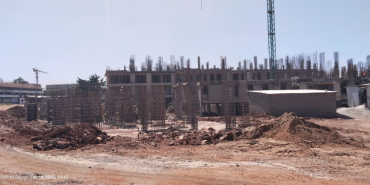Kenyan Landowners Face Greater Risk from Family Disputes than Fraud

A comprehensive survey on land ownership in Kenya has revealed that family disputes pose a greater threat to landowners losing their property than external factors such as fraud and corruption.
The Kenya Housing Basic Survey Report 2023–2024, published by the Kenya National Bureau of Statistics (KNBS), highlights the intricate interplay of inheritance, cultural norms, and tenure security in shaping the nation's land dynamics. The report, which delves into various aspects of housing and land ownership, underscores that familial disagreements are the leading cause of involuntary land loss in Kenya. According to the findings, 38.6 percent of cases of land loss are attributed to family-related wrangles, far exceeding other causes such as corruption in land administration, which accounts for 15.7 percent.
This revelation challenges conventional perceptions of land tenure security, where external threats such as fraud and government interference are often considered the primary risks. Instead, the survey suggests that internal family dynamics, particularly those related to inheritance, play a more significant role in determining land ownership stability. Land inheritance is the predominant method of land acquisition in Kenya, with 53.5 percent of parcels owned acquired through this means. Land purchased makes up 31.0 percent, while allocations by family members trail at 8.6 percent.
This heavy reliance on inheritance contributes to the heightened susceptibility to intra-family conflicts, as disputes over property rights and management often lead to involuntary loss of land ownership or usage rights. The report's findings are corroborated by a 2019 analysis by the National Crime Research Centre, which identified families as key instigators of land-use crimes. Factors such as greed, poor land registration systems, and the commodification of land exacerbate these conflicts, affecting individual livelihoods and economic stability.
Despite the prevalence of disputes, Kenya’s perception of tenure security remains notably high, with 91.8 percent of citizens expressing confidence that their property rights are secure. This optimistic outlook may stem from the recognition of documented ownership, which the report describes as foundational to housing and economic development. Ownership documents such as title deeds, allotment letters, and certificates of lease play a crucial role in affirming legal rights.
However, the survey also reveals that only 66.0 percent of landowners hold title deeds, leaving a significant portion—15.9 percent—with no formal documentation. An additional 1.4 percent of individuals are unaware of the importance of land ownership documents. The consequences of undocumented ownership are manifold, ranging from limited access to credit facilities to vulnerabilities in legal disputes. Interestingly, the report suggests that the absence of a title deed poses a lower risk to land loss—only 2.0 percent—compared to intra-family conflicts.
Other factors, including government pronouncements (16.5 percent), community disputes (13.0 percent), and environmental challenges such as flooding, are also identified as potential threats. Election-related violence and loan recovery account for less than 1.0 percent, highlighting their relatively minor influence in the broader context. The survey delves into land usage patterns, revealing the multifaceted role of land in Kenyan society. Close to half of the parcels, at 47.2 percent, are dedicated to agricultural activities, reflecting the sector's importance in national and household economies.
Residential purposes, including homes and rental properties, comprise 47.1 percent, while speculative landholding is noted among 0.6 percent of owners. These figures underscore the diverse contributions of land to Kenya’s socio-economic fabric, from food security to housing provision. The report calls for strengthening legal frameworks and fostering transparency in land administration to mitigate conflicts and enhance secure tenure. It emphasises the significance of land documentation not only as a legal instrument but as a driver of economic stability and community development.
For instance, documents such as settlement scheme papers, trust deeds, and confirmation of grants complement traditional ownership proof, enabling greater inclusivity in land management systems. The implications of these findings resonate beyond the confines of family disputes. Land, as a critical component of housing and economic stability, demands meticulous governance and conflict resolution mechanisms.














Add new comment